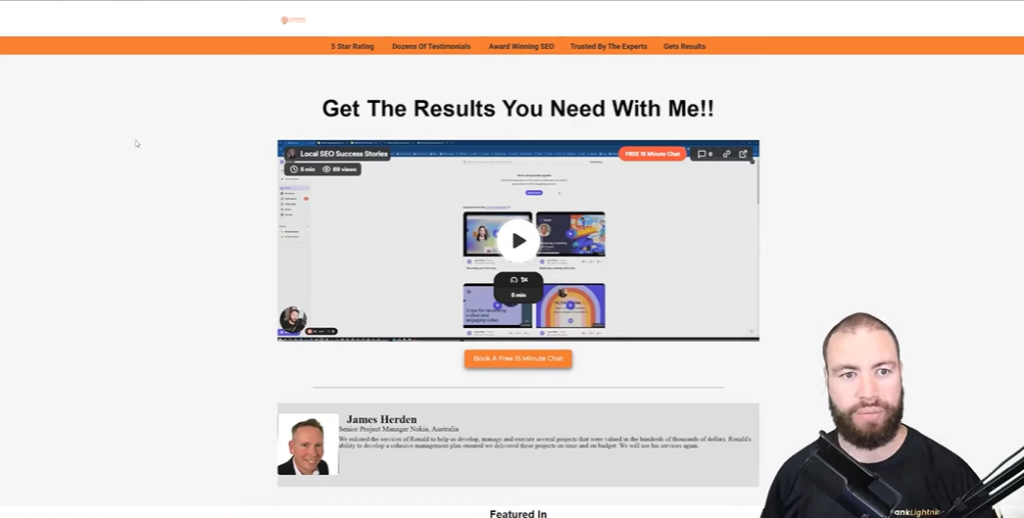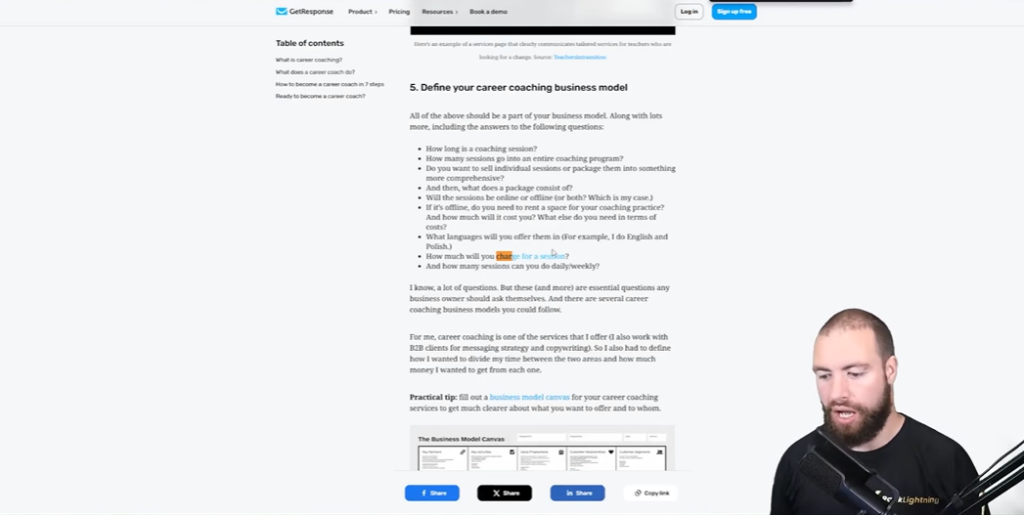I remember sitting in my home office just a few years ago, pondering the rapid evolution of digital marketing - it's astonishing how fast the landscape shifts. Now, as we approach 2025, the future of SEO seem even more monumental. AI technologies are reshaping how we search, and I've gathered some insights that will help you navigate this new terrain effectively.
TL;DR: SEO is changing rapidly in 2025 with AI-driven search functions dominating results. This post outlines strategies to adapt, focusing on the importance of powerful backlinks and the shifting landscape of local SEO.
Table of Contents
The Dominance Of AI In Search
As I dive into the world of search engine optimization, one thing becomes crystal clear: AI is taking the lead. It’s reshaping how we think about search results and the strategies we use to reach our audiences. But what does this mean for us? Let’s break it down.
AI's Role In Refining Search Results
AI is no longer just a buzzword; it’s a game-changer. Think about it: when you type a query into Google, AI algorithms are working behind the scenes to deliver the most relevant results. These algorithms analyze countless factors, including user behavior and content quality, to refine what you see. This means that the days of basic keyword stuffing are fading fast.
Instead, we need to focus on creating high-quality content that resonates with users. If AI can understand context and intent, then our content must be crafted with that in mind. It’s not just about answering questions anymore; it’s about providing comprehensive, engaging answers that keep users on the page.
Predictions On Listicles And Detailed Queries
Now, let’s talk about the future. I predict that we’ll see a rise in curated listicles generated by AI. Imagine searching for "best roofers in Miami" and getting a neatly formatted list of options, complete with reviews and ratings. This isn’t just a dream; it’s a likely reality as Google continues to refine its AI capabilities.
Why is this important? Because it changes the way we approach content creation. Instead of just focusing on traditional blog posts, we need to think about how we can create content that fits into these AI-generated formats. Listicles and detailed guides will become essential tools for capturing attention in a crowded digital landscape.
The Shift From Traditional SEO To AI-Driven Models
We’re witnessing a significant shift from traditional SEO methods to AI-driven models. This is not just a trend; it’s a transformation. As Ronald Osborne pointed out in his video, the value of organic search may decrease if AI can effectively answer user queries. This means we need to adapt.
- Focus on high-quality backlinks: By 2025, only the strongest backlinks will hold value. It’s time to build relationships with authoritative sites.
- Embrace omnichannel marketing: As organic leads dwindle, we should explore diverse strategies like lead magnets and cold emails.
- Upskill continuously: The SEO landscape is evolving, and so should we. Learning new skills that complement our existing strategies is crucial.
It’s a lot to take in, right? But the key takeaway is that AI is here to stay, and it’s reshaping our approach to search. We can’t ignore it. Instead, we need to embrace it and find ways to leverage its capabilities to our advantage.
In this rapidly changing environment, staying ahead of the curve is essential. As we adapt to these shifts, let’s remember that while SEO is evolving, it’s not dead. It’s simply transforming, and we have the opportunity to lead the charge.
Changes In Local SEO Dynamics

As I dive into the changes happening in local SEO, I can’t help but feel a mix of excitement and concern. The landscape is shifting, and we need to stay ahead of the curve. Let’s explore some key areas that are likely to shape our strategies moving forward.
Anticipating Shifts In Google Maps Functionality
First off, let’s talk about Google Maps. It’s more than just a navigation tool; it’s a critical part of local SEO. But what’s next for Maps? I believe we’re on the brink of significant changes. Google is always refining its algorithms, and I suspect they’ll tighten the reins on how businesses can optimize their presence.
Imagine this: you search for “best coffee shop near me,” and instead of a straightforward list, you get a curated selection based on AI-driven insights. This could mean less visibility for smaller businesses. If Google prioritizes certain listings, how will we ensure our clients stand out? It’s a real challenge we need to prepare for.
Potential Ad Integrations In Local Searches
Now, let’s shift gears to advertising. I’ve been following trends closely, and I foresee a significant integration of ads into local search results. Picture this: you’re searching for a local service, and the first few results are paid ads disguised as organic listings. How will users differentiate between the two?
According to Ronald Osborne, “Google’s revenue is heavily reliant on advertising, accounting for about 85% of its income.” This means they’re likely to push paid ads even more aggressively. As marketers, we need to adapt. We might need to rethink our strategies to incorporate paid ads effectively, while still maintaining a strong organic presence.
Why Local SEO Tactics Remain Crucial
Despite these challenges, I firmly believe that local SEO tactics are still essential. Why? Because local searches are incredibly powerful. People are looking for services nearby, and if we can position our clients effectively, they’ll reap the benefits.
- Local relevance: Businesses that engage with their communities will always have an edge.
- Customer trust: Authentic local SEO builds trust, and that’s invaluable.
- Adaptability: As the landscape changes, those who can pivot will thrive.
We must focus on high-quality backlinks and genuine engagement with local audiences. It’s about building relationships, not just rankings. As Osborne points out, “Only high-quality backlinks will be effective.” This means we need to be strategic about our outreach and partnerships.
In conclusion, the dynamics of local SEO are evolving. With potential shifts in Google Maps functionality and increased ad integrations, we need to stay vigilant. But I believe that with the right tactics, we can navigate these changes successfully. Let’s embrace the challenge and adapt our strategies to ensure we remain relevant in this ever-changing landscape.
The Importance Of Powerful Backlinks

When we talk about backlinks, it’s essential to understand what makes a backlink powerful. A powerful backlink is not just any link pointing to your site. It comes from a reputable, high-authority website. Think of it like a vote of confidence. If a respected site links to you, it signals to search engines that your content is valuable. But what exactly constitutes a powerful backlink?
Defining Powerful Backlinks
A powerful backlink typically has the following characteristics:
- High Domain Authority: Links from sites with high domain authority (DA) carry more weight. For instance, a link from a site like Forbes is more valuable than one from a small blog.
- Relevance: The linking site should be relevant to your niche. A link from a health blog is more beneficial for a fitness site than a link from a tech blog.
- Natural Placement: Links should appear naturally within quality content. They shouldn’t look forced or out of place.
In essence, powerful backlinks are like endorsements from trusted sources. They can significantly boost your site's credibility and visibility in search results.
The Decline Of Mid-Tier Backlink Effectiveness
Now, let’s talk about the changing landscape of backlinks. In recent years, I’ve noticed a decline in the effectiveness of mid-tier backlinks. These are links from sites that have some authority but aren’t top-tier. They used to provide a decent boost, but as search engines evolve, they’re becoming less impactful.
Why is this happening? Well, search engines are getting smarter. They can now differentiate between high-quality and low-quality links. As a result, mid-tier links are losing their value. It’s like trying to get a recommendation from someone who isn’t well-known in their field. It just doesn’t carry the same weight.
So, what does this mean for us? It means we need to focus on acquiring high-authority backlinks to stay competitive. But how do we do that?
Strategies To Acquire High-Authority Backlinks
Here are some effective strategies I’ve found useful:
- Create High-Quality Content: This is the foundation. If your content is valuable, others will want to link to it. Think of unique research, in-depth guides, or engaging infographics.
- Guest Blogging: Reach out to reputable sites in your niche and offer to write a guest post. This not only gets you a link but also exposes your brand to a new audience.
- Build Relationships: Networking is crucial. Engage with influencers and other bloggers in your field. A simple comment on their posts or sharing their content can go a long way.
- Utilize Social Media: Share your content on social platforms. The more visibility it gets, the higher the chances of someone linking back to it.
- Monitor Competitors: Use tools to analyze your competitors’ backlink profiles. If they’re getting links from certain sites, there’s a good chance you can too.
In conclusion, as we navigate the ever-changing world of SEO, focusing on acquiring powerful backlinks is essential. The landscape is shifting, and we must adapt our strategies accordingly. Powerful backlinks are not just a nice-to-have; they are a necessity for anyone looking to thrive in the digital space.
The Role Of SEO Agencies

When I think about the role of SEO agencies, I see them as vital players in the digital marketing arena. They are the navigators in a sea of ever-changing algorithms and search engine trends. But what exactly do they do? Let's break it down.
1. Understanding SEO Basics
First off, SEO stands for Search Engine Optimization. It’s the practice of enhancing your website so it ranks higher in search engine results. This means more visibility and, ideally, more traffic. But SEO isn’t just about stuffing keywords into your content. It’s a complex mix of strategies that includes:
- Keyword Research: Finding the right terms that potential customers are searching for.
- On-Page Optimization: Adjusting website elements like titles, meta descriptions, and content.
- Off-Page Optimization: Building backlinks and improving site authority.
- Technical SEO: Ensuring your website is crawlable and user-friendly.
SEO agencies specialize in these areas, helping businesses navigate the intricacies of search engines. But why is this important? Well, think about it: when was the last time you went past the first page of Google? Exactly.
2. The Importance Of Expertise
SEO is not a one-size-fits-all solution. Each business has unique needs and challenges. This is where SEO agencies shine. They bring expertise and experience to the table. They stay updated on the latest trends and algorithm changes. For instance, Ronald Osborne, founder of Osbourne Digital Marketing, emphasizes the growing role of AI in SEO. He predicts that by 2025, AI will dominate search results, making it crucial for businesses to adapt their strategies accordingly.
Imagine trying to navigate a new city without a map. You might find some interesting places, but you’d likely miss out on the best spots. SEO agencies provide that map. They guide businesses through the complexities of digital marketing, ensuring they reach their destination efficiently.
3. Tailored Strategies For Success
Another key role of SEO agencies is crafting tailored strategies. They analyze your business, your audience, and your competition. Based on this analysis, they develop a customized plan. This plan might include:
- Content Creation: Developing high-quality, engaging content that resonates with your audience.
- Link Building: Acquiring backlinks from authoritative sites to boost your credibility.
- Local SEO: Optimizing your presence in local search results, which is crucial for brick-and-mortar businesses.
As Osborne points out, local SEO will remain relevant, but it may become more challenging due to algorithm changes. This means businesses need to be proactive and adaptable.
4. Monitoring And Adjusting Strategies
SEO is not a set-it-and-forget-it endeavor. It requires ongoing monitoring and adjustments. SEO agencies use various tools to track performance metrics. They analyze data to see what’s working and what isn’t. This allows them to refine strategies continuously.
Think of it like gardening. You plant seeds, but you also need to water them, prune them, and sometimes even change the soil. SEO agencies do the same for your online presence. They ensure your strategies grow and evolve.
5. The Future Of SEO Agencies
As we look toward the uncertain, the future of SEO agencies will only grow. With the rise of AI and changing consumer behavior, businesses will need expert guidance more than ever. As Osborne suggests, those who adapt will thrive, while others may struggle.
In this dynamic landscape, SEO agencies will be the partners that help businesses navigate challenges and seize opportunities. They are not just service providers; they are essential allies in the quest for online visibility and success.
Strategies For Future-Proofing Your Business This 2025

As we look ahead to 2025, it’s clear that the business landscape is shifting. I’ve been diving deep into the trends and predictions, and I want to share some strategies that can help us all stay ahead of the curve. Here are three key areas to focus on:
1. Capitalize On The Predicted Market Shifts
Market shifts are inevitable. They can be driven by technology, consumer behavior, or even global events. The key is to stay informed and be ready to adapt. For instance, the rise of AI in search engines is a game changer. Ronald Osborne, a digital marketing expert, emphasizes that AI will dominate search results. This means we need to rethink how we approach our online presence.
Are we prepared for a world where basic queries yield AI-generated listicles? If Google is focused on providing quick answers, we might need to adjust our content strategies. Instead of just aiming for organic search rankings, we should consider how we can create content that aligns with AI-generated responses. This could mean focusing on quality over quantity and ensuring our information is easily digestible.
2. Explore Synergistic Partnerships
In times of change, collaboration can be our greatest asset. I’ve seen firsthand how forming partnerships with other businesses can lead to innovative solutions. By working together, we can leverage each other’s strengths. This is especially important as competition increases and marketing costs rise.
- Identify Complementary Businesses: Look for companies that offer services or products that complement yours.
- Share Resources: Pooling resources can help reduce costs and enhance service offerings.
- Problem-Solving Together: Collaborating can lead to creative solutions that we might not have considered alone.
Osborne suggests that many marketing agencies may struggle in the coming years. This could create opportunities for those of us who are willing to adapt and innovate. By forming synergistic partnerships, we can not only survive but thrive in this evolving landscape.
3. Adapt Your Marketing Strategies To Accommodate Rising Costs
As advertising costs continue to climb, we must rethink our marketing strategies. It’s no longer enough to rely solely on organic leads. We need to adopt an omnichannel approach. This means utilizing various platforms and methods to reach our audience.
Consider implementing lead magnets or cold emailing strategies to supplement your existing efforts. These tactics can help us extract more value from our current leads. As Osborne points out, the focus should be on enhancing our skills and finding new ways to engage with potential customers.
Are we ready to embrace these changes? It’s crucial that we stay proactive. Upskilling ourselves and our teams can make a significant difference. Whether it’s learning about new digital marketing tools or understanding the latest trends in consumer behavior, investing in our knowledge is key.
In conclusion, as we prepare for 2025, let’s focus on these three strategies: capitalizing on market shifts, exploring partnerships, and adapting our marketing efforts. The future may be uncertain, but with the right approach, we can navigate it successfully.
Conclusion: Embracing Change For Growth
As I reflect on the ever-evolving future of SEO, one thing becomes clear: change is inevitable. Just like the seasons shift, so too does the world of search engine optimization. We can’t ignore it. We must embrace it. The rise of AI, for instance, is reshaping how we approach SEO strategies. It’s not just a trend; it’s a transformation that’s already underway.
The Inevitability Of Change In SEO
Change in SEO is like the tide; it comes in waves. Each new algorithm update or technological advancement brings a fresh set of challenges and opportunities. I often think about how Google is constantly refining its AI capabilities. It’s fascinating, yet daunting. Basic queries might soon yield curated listicles generated by AI, which means we need to rethink how we create content. Will organic search still hold its value? Or will it fade into the background as AI takes center stage?
We can’t afford to sit back and hope for the best. Instead, we must adapt. As I’ve discussed, the future may see a significant decrease in the importance of organic listings. If AI can provide quick answers, what does that mean for our strategies? We need to be proactive, not reactive.
Importance Of Staying Informed
Staying informed is crucial in this fast-paced environment. I can’t stress enough how vital it is to keep your finger on the pulse of SEO trends. Knowledge is power. By understanding the latest developments, we can make informed decisions that will help us navigate the complexities of search engine algorithms.
For instance, as Google integrates paid ads into AI responses, distinguishing between organic results and paid promotions will become increasingly challenging. This shift could impact how businesses allocate their marketing budgets. Are we prepared for that? It’s essential to stay updated on these trends to avoid falling behind.
Final Thoughts On Taking Proactive Steps
As we look toward the future, I encourage everyone to take proactive steps. This isn’t just about survival; it’s about thriving in a changing landscape. One strategy I recommend is focusing on building high-quality backlinks. As mid-tier links lose value, we must prioritize acquiring links from authoritative websites. This shift will be crucial for maintaining our visibility in search results.
Moreover, I believe that forming partnerships with synergistic businesses can amplify our strengths. Together, we can tackle challenges more effectively. It’s about leveraging collective resources to navigate the complexities of SEO.
In conclusion, while SEO is evolving, it’s not dead. We have the opportunity to adapt and grow. By diversifying our marketing strategies and embracing advancements in AI, we can position ourselves for success. Let’s not wait for change to happen; let’s be the change-makers. The future of SEO is bright for those willing to embrace it.
So, let’s stay informed, take proactive steps, and face the future with confidence. Together, we can navigate this exciting journey ahead.




